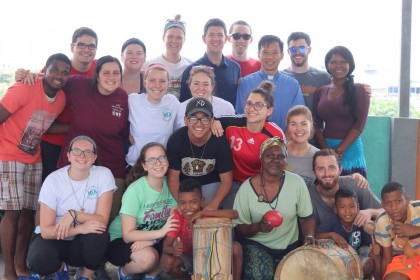Ministry of Presence
Devra Torres | Jun 28, 2018 | 1 cmt

My daughter Rachel (front row, second from left) recently spent a week in Ecuador with an organization called Rostro de Cristo ("Face of Christ").
"What did you do there?" I asked. "Build shelters? Distribute food and medicine? Entertain the children?"
"No," she said. "It's called the 'ministry of presence.'"
Most high school or college mission trips, of course, are as much about opening the eyes of the helpers as about bringing aid to the help-ees. My son went to the Dominican Republic (his paternal grandfather's birthplace) a few years ago and helped construct a small building for the kids at an orphanage. But if it were really just about producing a building, there are more efficient ways to do that than import a handful of amateur gringo construction workers for a week and a half. It's also about opening the eyes of the gringos. But what else?
My daughter's group made that "what else" explicit. There was no pretense that they were there to provide some easily measurable benefit to the residents of Arbolito, on the outskirts of Guayaquil. They were there to carry out this "ministry of presence." They met the people, talked with them, listened to them, got to know them. They also bought some of their very beautiful handicrafts as gifts for us back home, but if that were the whole point--again, there are more efficient ways to garner extra income for Ecuadorian artisans in need.
Employee Mendoza-Waters of Campus Ministry at Catholic University of America says they're aiming for "true service rather than volunteerism." Volunteerism, it seems to me, points back to the person who's volunteering. It's something you can put on your transcript, on your résumé: documentation that you've checked the altruism box. Service, though, is service to someone, And of course it's not just for the elite. Catholic University works to make mission trips affordable. "If mission trips are only for the rich, and only the rich could serve the poor," Mendoza-Waters explains, "it’s defeating the purpose of what we’re trying to do,”
My daughter's group met the inhabitants and lived in relative poverty while they were there, sharing an experience rather than doling out benefits from afar. Looking a person in the eye is a fine antidote for the theories of armchair sociologists or theologians, which all too easily degenerate into using actual poor people as props, as pawns, as "Exhibit A"'s. Efforts to change people's lives get overshadowed by the itch to persuade fellow armchair dwellers of one's favorite systemic solutions.
You might fault the poor for not pulling themselves up by their bootstraps--until you meet the lady who can never leave her hut, because she knows the minute she does, thieves will seize everything.
You might wonder why they don't try to build up a little business-- until you meet the villagers who have no running water or electricity, since they were swindled into picking up and moving to land that the city refuses to service, because it turns out the sale of it was illegal. You can't blame 100% of the evils on the rich, either, when you see the poor preying on one another.
In other words, you learn some facts you didn't know before. But more than that, you see the responses of the people: you're struck, as my daughter was, because, over and over, she heard people saying "gracias a Dios" (thanks be to God) for comforts and consolations so minimal it would never occur to us to be grateful for them.
Don't get me wrong! Without rich people writing checks from afar, none of the food, clothing, shelter and airplane tickets that make help possible would happen. Tangible help is required even for a ministry of presence to happen. And there are tangible benefits of the ministry once it does. Some of the students stay for years, saving lives or starting their own aid organizations, or they go back home and raise funds. Or they see their own opportunity for an education with new eyes and take better advantage of it, to the benefit of everyone whose path they cross.
But lose the personal contact and you lose the heart of the whole thing. Not everyone has to go to Guayaquil. The ministry of presence is something you can practice with your mother-in-law, your mailman, or, better yet, with the people in your own immediate family--the ones most likely to get lost in the shuffle of the struggle to keep the tangible benefits coming. The ministry of presence, it turns out, is something everyone everywhere is meant both to practice and to receive.

Comments (1)
Rhett Segall
Jun 30, 2018 12:07pm
Rachael's experience of the presence of the Ecuadorian poor reminds me of the experience of the girls portrayed in "Julia" who met the dirt poor of Egypt, those who scoured the garbage dumps for food."It's so sad to see them" Julia says. Julia's grandparents tell her and Lilian "not to look at them". Of course the experience will be pivotal in both girls lives, each bringing to the destitute their own particular gifts.
The challenge for Rachael will be to both appreciate what she is given and to share it intelligently as life unfolds her particular gifts. You exemplify how quite clearly.
P.S. I'm delighted the comment channel is here again!. I've been trying to make contact without success. Will Katie and Jules continue to post?